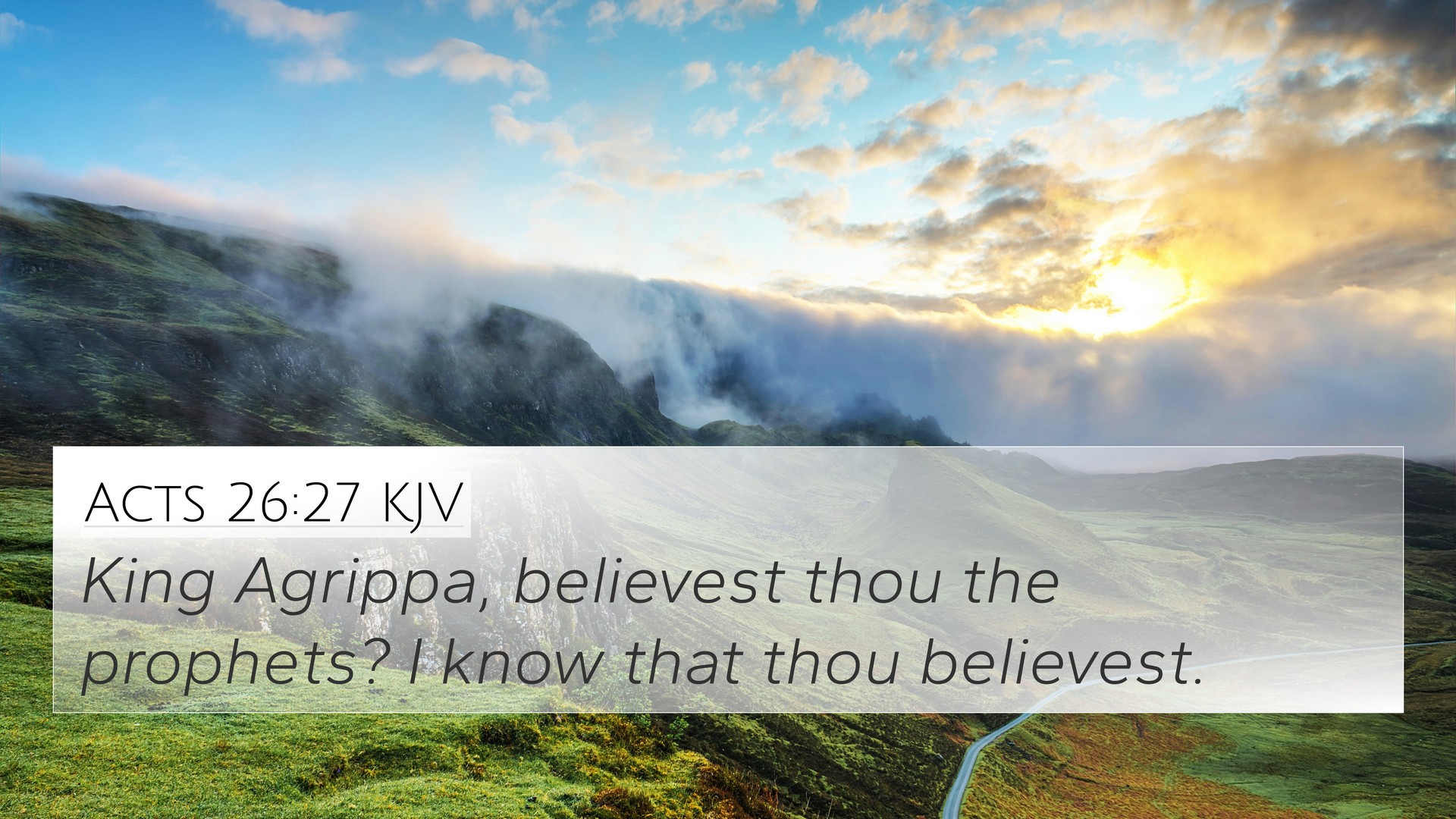Meaning and Interpretation of Acts 26:27
Acts 26:27 reads: "King Agrippa, do you believe the prophets? I know that you believe." This verse occurs during Paul's defense before King Agrippa, where he inquires about the belief in the prophets, leading to significant themes of faith, testimony, and the intersection of ancient prophecies with the events of the early Christian church.
Contextual Background
In the book of Acts, the Apostle Paul is on trial for his faith and teachings regarding Jesus Christ. Before a gathering that includes King Agrippa and Festus, Paul makes a compelling case for the truth of the resurrection and the fulfillment of the prophecies of the Old Testament.
Commentary Insights
This verse can be understood more profoundly through the analyses provided in various public domain commentaries. Key commentators, such as Matthew Henry, Albert Barnes, and Adam Clarke, offer insights that enhance our understanding of this pivotal moment in Acts.
-
Matthew Henry's Commentary emphasizes the significance of Paul's confidence when addressing Agrippa. He suggests that Paul's appeal to the prophets is not merely an examination of belief but serves as a reminder of the prophetic tradition that underscores the authenticity of the Gospel.
-
Albert Barnes points out that Paul's question implies that Agrippa, as a Jew and a ruler well-versed in Jewish traditions, must acknowledge the credibility of the prophets. This highlights the interplay between faith and knowledge, where understanding is paramount in belief.
-
Adam Clarke elaborates on the rhetorical strategy Paul employs by asking Agrippa if he believes in the prophets, knowing well the implications. Clarke indicates this as a critical moment for Agrippa, forcing him to confront his preconceptions regarding Jesus as the Messiah.
Significance of the Question
Paul's question, "Do you believe the prophets?" serves multiple purposes: it invites Agrippa into a dialogue of faith, it highlights the continuity between the Old and New Testament, and it prompts all present to consider their stance on the fulfillment of God's promises through Christ.
Cross-Referencing Related Bible Verses
This verse presents an opportunity for cross-referencing with several significant passages that enhance our understanding of the themes introduced by Paul:
- Isaiah 53:1 - Prophetically speaks to the suffering servant and the belief in the message of the prophets.
- Jeremiah 29:13 - Highlights the search for understanding and the promise of finding it when sought with all one's heart.
- Matthew 5:17 - Jesus speaks of the fulfillment of the Law and the Prophets, linking them to His ministry.
- Luke 24:27 - Jesus explains to the disciples on the road to Emmaus how the scriptures testify of Him.
- Acts 3:18 - Peter discusses how what has occurred is a fulfillment of what the prophets foretold.
- 1 Peter 1:10-12 - Discusses how the prophets prophesied of the grace and sufferings to come, seeking to understand the times.
- Hebrews 1:1-2 - Introduces how God has spoken to the fathers through the prophets and finally through His Son.
Thematic Connections
This conversation opens themes fundamental to Biblical interpretation, such as:
- Faith and Prophecy: The intrinsic link between believing in God's message and the fulfillment of that message as seen through Christ.
- Testimony: The importance of personal testimony—the way that Paul's confidence in his knowledge and faith challenges others to reflect on their beliefs.
- Legacy of Prophecy: Establishing a continuity from the Old Testament prophecies through to the New Testament revelations, reaffirming the divine plan of salvation.
Conclusion
Acts 26:27 stands as a profound inquiry that demands introspection from those who encounter it. Paul’s engagement with Agrippa is not only a defense of his faith but a challenge to all to consider the depth of their beliefs in light of prophetic truth.
In summary, this verse encapsulates the essence of Bible verse cross-references by presenting an opportunity for thematic Bible verse connections that resonate through both testaments, urging a full understanding of how these scriptures inform and bolster one another in the tapestry of faith.



